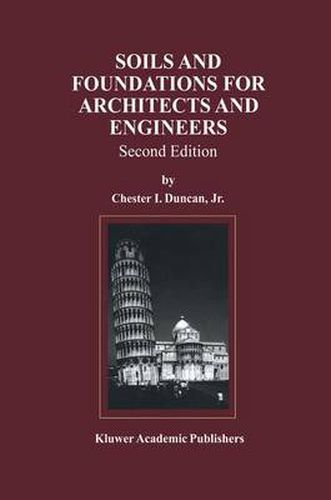Readings Newsletter
Become a Readings Member to make your shopping experience even easier.
Sign in or sign up for free!
You’re not far away from qualifying for FREE standard shipping within Australia
You’ve qualified for FREE standard shipping within Australia
The cart is loading…






This title is printed to order. This book may have been self-published. If so, we cannot guarantee the quality of the content. In the main most books will have gone through the editing process however some may not. We therefore suggest that you be aware of this before ordering this book. If in doubt check either the author or publisher’s details as we are unable to accept any returns unless they are faulty. Please contact us if you have any questions.
A practical guide to the technology of soil mechanics and foundations, and the application of that technology to the design and construction process. This text provides an up-to-date overview of the classification of soils, the design of foundations, and the behaviour of soils under load in the late 1990s. Particular emphasis has been given to the subject of piles, piers, and caissons, and the the design and details of construction of basement and retaining walls. This edition includes: expanded coverage of shear strength of soils, settlement analysis, and expansive soil; design requirements for prestressed tiebacks, tiedowns, and rock anchors; expansion of information on pile driving techniques including the use of the Engineering News Formula; a table of British-metric conversions; and many solved problems and illustrations. In addition to the numerous improvements, the author also includes: effects of high water tables on architectural and engineering considerations; design of shear keys used in the transfer of lateral earth pressure from a wall to the supporting element; various drainage alternatives to the structural treatment of adjacent footings; and more. This text can be used in advanced undergraduate and graduate level courses offered in architectural engineering and civil engineering, as well as be used as a reference book by practicing architects, insurance adjusters and attorneys who litigate or adjudicate claims involving soils and foundations.
$9.00 standard shipping within Australia
FREE standard shipping within Australia for orders over $100.00
Express & International shipping calculated at checkout
This title is printed to order. This book may have been self-published. If so, we cannot guarantee the quality of the content. In the main most books will have gone through the editing process however some may not. We therefore suggest that you be aware of this before ordering this book. If in doubt check either the author or publisher’s details as we are unable to accept any returns unless they are faulty. Please contact us if you have any questions.
A practical guide to the technology of soil mechanics and foundations, and the application of that technology to the design and construction process. This text provides an up-to-date overview of the classification of soils, the design of foundations, and the behaviour of soils under load in the late 1990s. Particular emphasis has been given to the subject of piles, piers, and caissons, and the the design and details of construction of basement and retaining walls. This edition includes: expanded coverage of shear strength of soils, settlement analysis, and expansive soil; design requirements for prestressed tiebacks, tiedowns, and rock anchors; expansion of information on pile driving techniques including the use of the Engineering News Formula; a table of British-metric conversions; and many solved problems and illustrations. In addition to the numerous improvements, the author also includes: effects of high water tables on architectural and engineering considerations; design of shear keys used in the transfer of lateral earth pressure from a wall to the supporting element; various drainage alternatives to the structural treatment of adjacent footings; and more. This text can be used in advanced undergraduate and graduate level courses offered in architectural engineering and civil engineering, as well as be used as a reference book by practicing architects, insurance adjusters and attorneys who litigate or adjudicate claims involving soils and foundations.